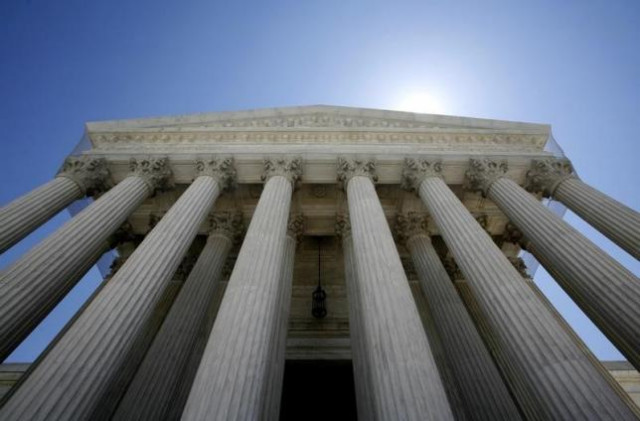US Supreme Court punts on contraception coverage case
The court was considering whether the government was violating the religious freedom of certain faith-based groups

PHOTO: REUTERS
The court was considering whether the government was violating the religious freedom of certain faith-based groups by providing health insurance covering birth control to their female employees.
Top Indian lawyer ordered to inspect sexy condom packets
It was the fourth time in as many years that a challenge to President Barack Obama's flagship health reform ended up before the justices, this time in the midst of a heated election cycle and a partisan standoff over filling an empty seat on the Supreme Court bench.
In a unanimous ruling, the justices said remanding the issue to lower courts was "more suitable" and noted that they expressed "no view on the merits of the cases."
"In particular, the Court does not decide whether petitioners' religious exercise has been substantially burdened, whether the government has a compelling interest, or whether the current regulations are the least restrictive means of serving that interest," the decision said.
Religious organizations can opt out of the Obamacare birth control mandate by providing written notification of their opposition on faith grounds.
The battle for birth control: Afghanistan's new fight
The Supreme Court ruled in 2014 that family-owned private companies -- including arts and crafts retailer Hobby Lobby -- could also choose not to provide contraceptive coverage to female employees on religious grounds.
In such cases, insurance companies and the government become responsible for providing the coverage directly to the concerned women.
But religious non-profits had argued that the government's accommodation still burdened their free exercise of religion by making them complicit in providing contraception, contrary to their beliefs.
The plaintiffs in the seven combined lawsuits had argued that the Obamacare requirement violates a federal law protecting religious freedom.
All but one federal appeals court had ruled in favor of the government in earlier decisions in the cases.
Monday's ruling came after the parties showed in briefs to the court that they could reach a compromise on how women could obtain contraception coverage from insurance companies without direct involvement by their employers.
"Petitioners have clarified that their religious exercise is not infringed where they 'need to do nothing more than contract for a plan that does not include coverage for some or all forms of contraception,' even if their employees receive cost-free contraceptive coverage from the same insurance company," the decision said.
Plaintiffs in the case, Zubik versus Burwell, included schools as well as the Little Sisters of the Poor, a Catholic charity.
The White House said it was "pleased" with the Supreme Court's decision.
"It will allow millions of women across the country to continue to get the health care coverage that they need," spokesman Josh Earnest said.
Farväl: Swedish Ambassador hosts farewell
In passing the law requiring contraception coverage, Congress sought to address a nationwide problem, namely that women pay more than men for preventive care and therefore often do not seek such services.
The latest case was being closely watched as a test of a court that has been evenly split across ideological lines since the death of conservative justice Antonin Scalia in February.
A 4-4 tie would have left lower court rulings in effect.
Senate Republicans have refused to vote on a replacement for Scalia until US President Barack Obama leaves office next year.
Earnest said Obama continued to be concerned about the vacancy although it did not seem to have influenced Monday's decision.
"But I haven't heard anybody make the argument that leaving the Supreme Court of the United States short-staffed is somehow good for the country," he said.



















COMMENTS
Comments are moderated and generally will be posted if they are on-topic and not abusive.
For more information, please see our Comments FAQ